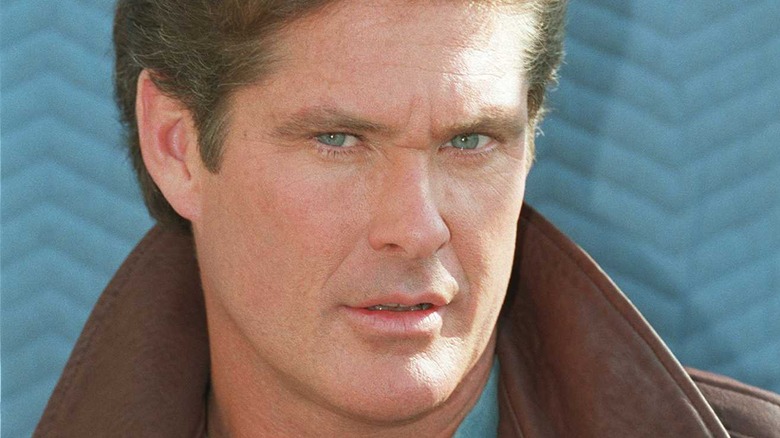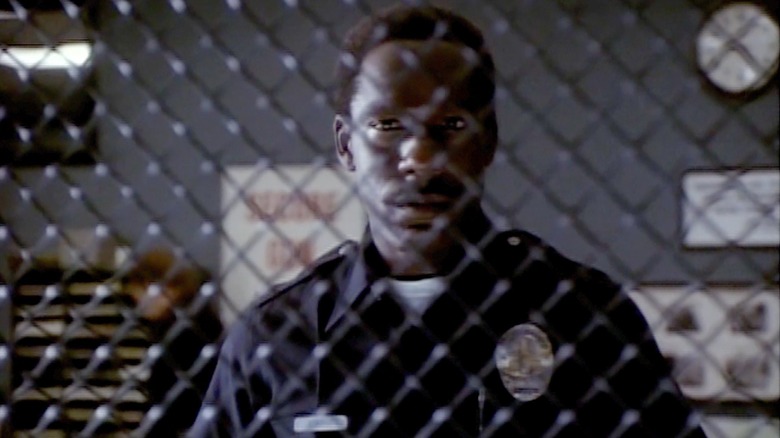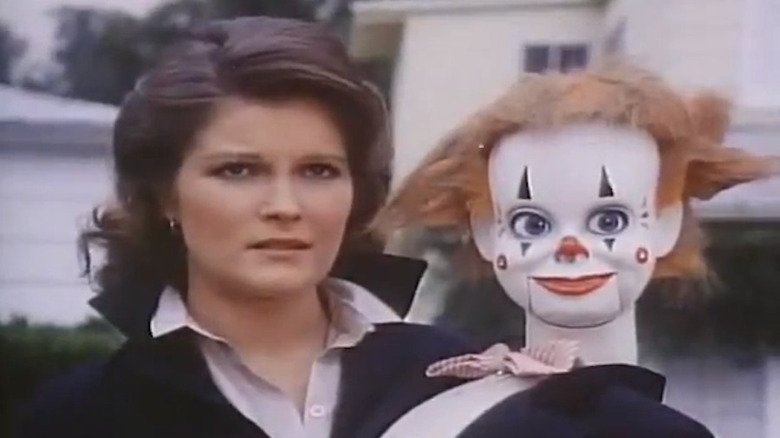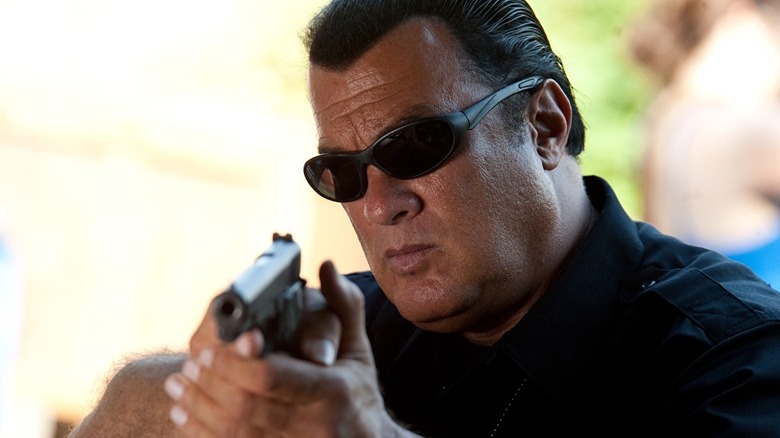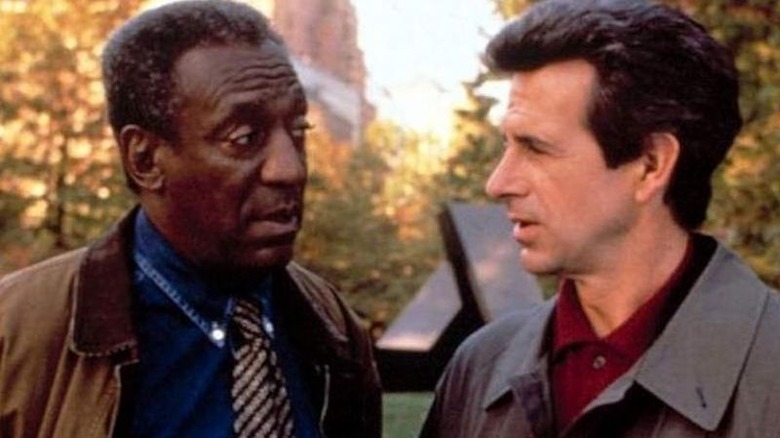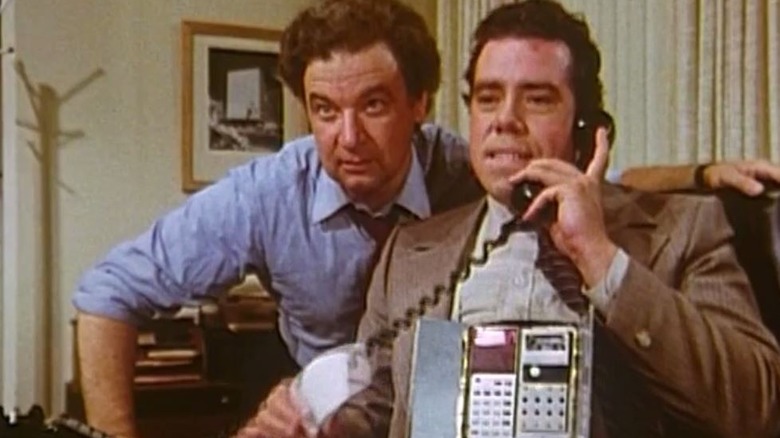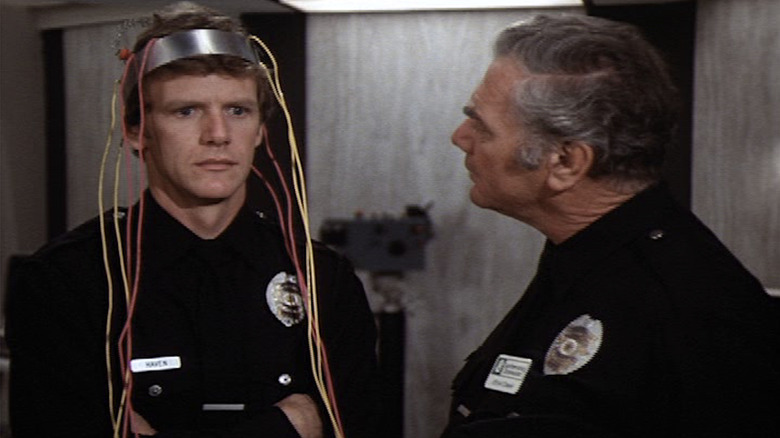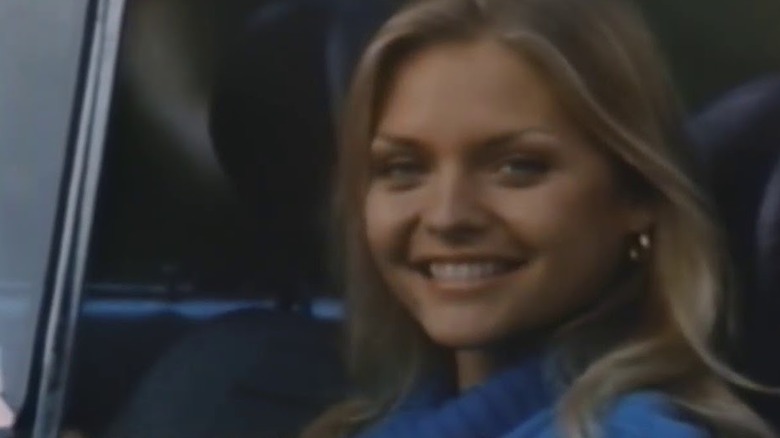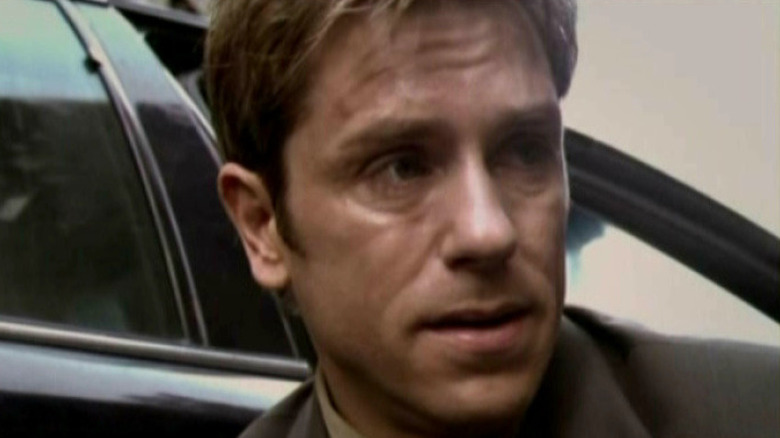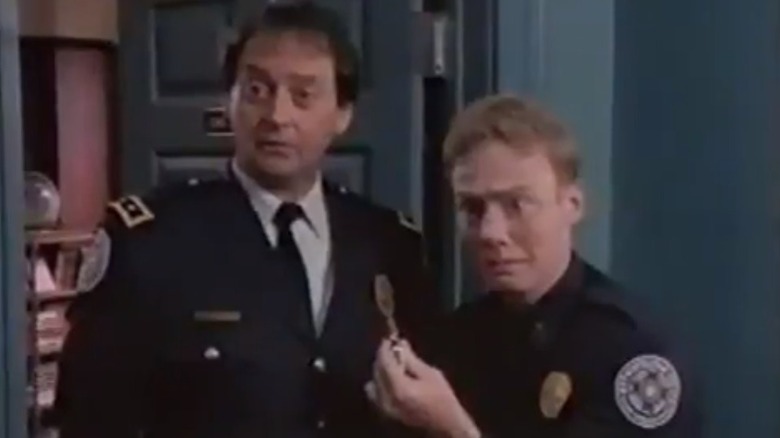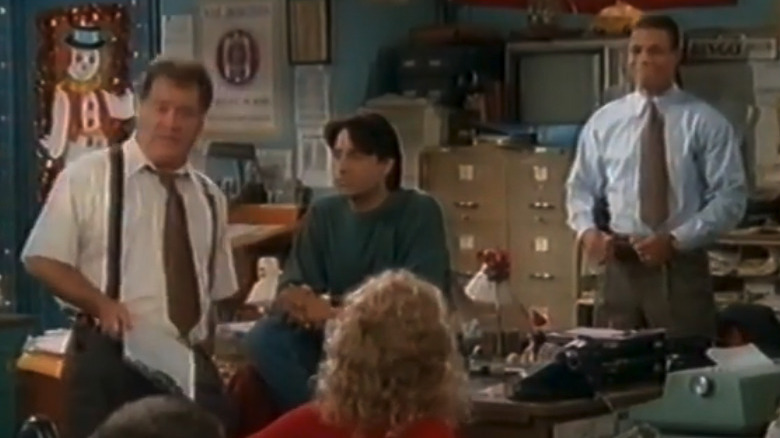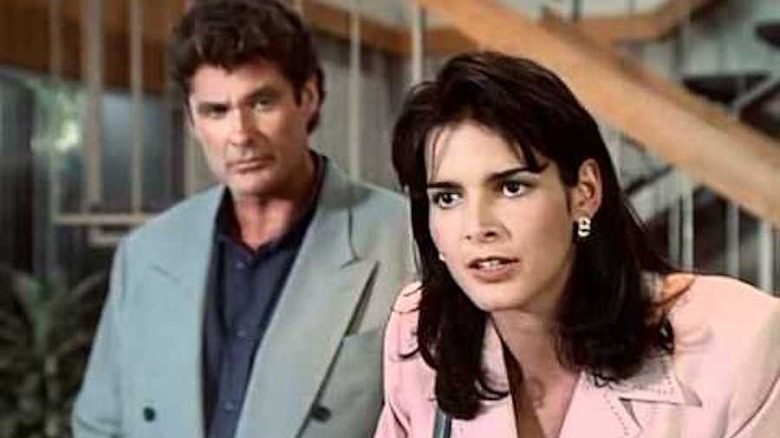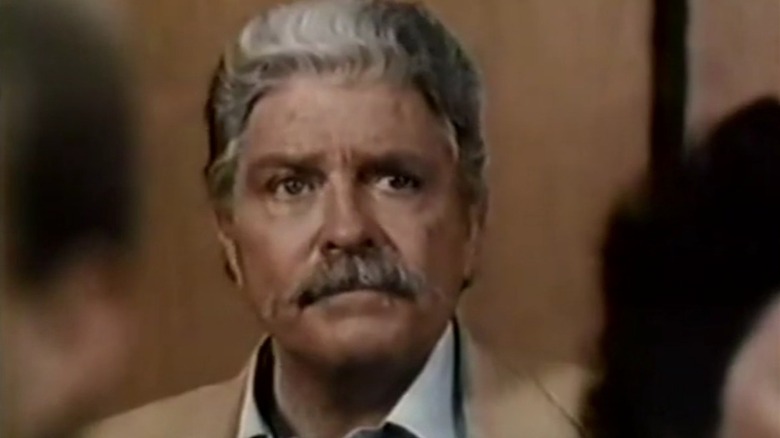12 Awful Cop Shows You Forgot About
From 1951's "Dragnet" to 2022's "Tokyo Vice," cop shows have long been one of the most popular genres on television. Some follow uniformed officers in a major metropolis, while others follow independent investigators roaming the country solving the latest crime of the week. No matter its exact presentation, the genre almost always offers clear-cut stakes: a justice-seeking hero, a crooked villain, and a good mystery. It can also subvert or challenge these traditional roles, as in shows like "The Shield" or "We Own This City." This adaptability has allowed the category to flourish despite contemporary critiques that it essentially functions as law enforcement propaganda.
Over the years, some of the best shows on TV have been cop dramas, police procedurals, investigative adventures, and even comedies, from "Law and Order" to "Brooklyn Nine-Nine." While we all remember the classics and the long-running hits, we tend to forget the dozens of awful ones: the cop clunkers that came and went and have since been filed away in the drawer of forgotten flops.
Some were spin-offs of well-known hits, while others were fresh, new ideas. But all were terrible and all were left behind. We're giving them new life here, resurrecting them for our list of 12 awful cop shows that you've forgotten about.
Cop Rock
Let's get the obvious one out of the way, because among connoisseurs of terrible TV, "Cop Rock" is practically legendary. Launched in 1990 on ABC, and created by Steven Bochco — the man behind "Hill Street Blues" and "L.A. Law" — this one seemed destined for success. But the series was more than just your standard police procedural; in addition to its weekly cases of criminal mischief and murder, "Cop Rock" was also a rousing musical, with singing and choreographed dancing between scenes of cops hunting down crooks.
Like his other shows, including his later hit "NYPD Blue," Bochco focused on more than just the police work, as the plot often delved into the cast's personal drama. It saw Captain John Hollander (Larry Joshua) investigating one of his own men, Detective Vincent LaRusso, who may have been involved in the death of a suspect. But it was hard to take the darker stories seriously when every now and then they'd break out into a hot little number.
According to Bochco (per AV Club), the idea was sparked when a Broadway producer approached him about turning "Hill Street Blues" into a musical. With a contract that allowed him to create an astonishing 10 new shows, he threw the 'musical cop show' idea into the bucket. Despite being heavily mocked by critics, audiences, and even David Letterman, the series wound up getting a DVD release in 2016.
Mrs. Columbo
One of the hottest cop shows on television, "Columbo" starred Peter Falk as a grumpy, quirky detective who solved the most unsolvable crimes for nearly a decade until the series' end in 1978. The network wanted a replacement and so drafted actress Kate Mulgrew to step in to play "Mrs. Columbo," who'd been referenced on the parent series but never seen. A working mother whose husband is never around, Kate Columbo juggles a newspaper job, a sassy daughter, and her hobby: solving her own cases.
The network's misguided effort to spin off a wildly popular prime-time hit crashed and burned. The show didn't live up to fans' expectations of the notorious detective's wife. Week-to-week mysteries should have given Mrs. Columbo a chance to shine, but the show never really got off the ground and was even retitled "Kate Loves a Mystery" for its final eight episodes in an effort to find its footing. Criticized as a watered-down, generic copy, it lacked the charming oddness of "Columbo."
Despite its failure, star Kate Mulgrew wasn't the problem, with the New York Times praising her performance in their review. Thankfully, the actress' career survived the embarrassment of "Mrs. Columbo." A decade later, she starred as Captain Janeway in "Star Trek: Voyager," and later as Red in "Orange Is the New Black."
True Justice
By 2010, early '90s star Steven Seagal wasn't just past his prime; he was nearly 15 years removed from his days starring in hit action movies. Still, someone thought it was a good idea to not only put Seagal in front of the camera but to also let him write and executive produce. Created by the actor as a starring vehicle for himself, "True Justice" put him in the role of Elijah Kane, head of an undercover task force called the Special Investigation Unit based in Seattle.
Kane is described in the series as the best of the best, an elite ex-military officer who leads his squad of lesser agents on missions around the city catching vaguely horrific baddies. His team is a ragtag mix of police show stereotypes, and each week's story is a mish-mash of generic plots stapled together. It tries so desperately to be cool that you can practically smell the Axe Body Spray coming off your screen. The show was mercilessly trolled by reviewers for its lame attempt at drama.
Seagal, ostensibly the main draw, long ago used up whatever acting talent he may have had, leaving "Total Justice" a dismal mess. The fact that it initially aired only in Spain should tell you something, though it eventually made its way stateside, airing its 26 episodes on Reelz, as mentioned by AV Club in their review, a network that's little more than a joke itself.
The Cosby Mysteries
From 1984 to 1992, long before he was a controversial criminal, comedian Bill Cosby led one of television's most popular sitcoms, "The Cosby Show," playing family patriarch Dr. Huxtable for eight seasons. Some years later, the actor starred as Hilton Lucas in the sitcom "Cosby" for five more, but between them he had another show, a cop comedy called "The Cosby Mysteries." You might scratch your head at the idea of the sitcom star taking on a cop show, but it's not as random as you might think, as one of Cosby's earliest hits was the classic secret agent comedy "I Spy" in the late 1960s. Still, "The Cosby Mysteries" is the actor's least-remembered exploit, and for good reason.
In the short-lived and largely forgotten series, Cosby plays a retired NYPD detective who left the force after winning a lottery jackpot. But now he's called back to consult on the toughest murder cases, assisting his old partner Detective Sully (James Naughton). Despite this goofy premise, the show takes itself a little too seriously. It can't decide if it wants to be a cop drama or a comedy and never quite gets the balance right, resulting in stories with little suspense and few laughs.
The show might be best remembered today as the butt of a joke on a 1999 episode of "The Simpsons" where Homer yells at a TV critic for getting the series canceled.
Holmes and Yoyo
Even before the likes of "Robocop," Hollywood loved the idea of a hero who was part man, part machine. After the success of "The Six Million Dollar Man" in 1973, network ABC wanted more. Their next effort brought a cyborg hero to law enforcement with the cop sitcom "Holmes and Yoyo." The series starred Richard B. Shull as Detective Alexander Holmes, a beleaguered officer reluctantly partnered with John Schuck as Detective Gregory "Yoyo" Yoyonovich, whom he discovers is actually an android. We know this because Yoyo has what looks like a calculator and a tape recorder taped to his chest.
Throughout the series' brief run in 1976, Holmes helps his robot sidekick be more human and struggles to keep his artificial nature a secret. Cheaply made as a screwball comedy, it's sadly not nearly as clever as it thinks it is, while its police stories are almost childlike. Plenty of gags are mined from Yoyo's robot nature, including a scene where Polaroid pictures spit out from his shirt when he's struck in the nose, while seemingly random incidents cause him to malfunction, leaving him to awkwardly breakdance or spin around uncontrollably.
More cringe-worthy than funny, it was put out of its misery after 13 episodes. But if you think its disastrous single season would convince the network to give up on the concept of a robot cop show, think again.
Future Cop
Even before "Holmes and Yoyo," ABC had aired a TV movie pilot for another android cop show starring "McHale's Navy" veteran Ernest Borgnine, titled "Future Cop." It received a series order even while "Holmes and Yoyo" was failing, but only five additional episodes were produced before the show met the same fate and got the ax the following year. Ditching the sitcom angle, "Future Cop" tried to be a more sincere sci-fi cop show, but failed spectacularly, unable to transcend the outlandishness of its premise.
Borgnine was known for his good-natured humor and charm, but in the show played Detective Cleaver, a skilled, dedicated cop who'll stop at nothing to solve the hardest cases. Commended more than once for going above and beyond the call of duty, he's awarded a Medal of Valor and is known around his precinct as the best cop on the beat. Now he's partnered with a synthetic android partner named John Haven (Michael J. Shannon). Together they battle crime on the streets while Haven adjusts to the human world.
While the show isn't the worst you'll see on this list, its biggest crime is simply doing nothing with its android cop premise. Haven has few superpowers, isn't conflicted about his artificial nature, and offers little to set the show apart from any other cop show on the air. In the end, it's just a bad, boring police procedural that tried to hook audiences with a sci-fi twist and failed.
B.A.D. Cats
Police procedurals in the late '70s and early '80s were an odd bunch, often mixing a healthy dose of fast-paced action and adventure on top of the more down-to-Earth crime stories of years past. So alongside more standard fare like "The Rockford Files" and "Hawaii Five-O" were the likes of "Starsky and Hutch" and "CHiPs." Along those same breezy action-oriented lines was the single-season 1980 flop "B.A.D. Cats," only notable today for having starred a young Michelle Pfeiffer.
A kind of inverted "Dukes of Hazzard," the show saw a pair of free-wheeling, reckless race car drivers join the LAPD and use their skills behind the wheel to chase down car thieves as part of the B.A.D. Cats squad (which stood for Burglary Auto Detail Commercial Auto Thefts... yes, they used "auto" twice in a single acronym). Built around high-speed car chases, the show had plenty of them, but beyond that offered little. They tackled some interesting cases, but it's no mystery series, leaving the audience with not much more to do than wait for the next big action scene.
A pale imitation of '70s classics, the two leads are just copy-and-paste versions of Bo and Luke Duke from "Dukes of Hazzard," while Pfeiffer is just a token blonde to keep teen boys watching when cars aren't crashing. If you can find clips online, you won't be at all surprised to learn that it didn't even air all of its 10 episodes.
Blind Justice
In what feels like a case of taking a clever title and working your way backward, producers decided that making a series about a police officer with impaired vision who carries a gun was a smart idea. The concept of a blind man fighting for justice has worked for the likes of Marvel's superhero "Daredevil," where the title character has superpowers, but grounding "Blind Justice" in the real world complicates matters.
Ron Eldard stars as Detective Jim Dunbar, who's blinded in a firefight and reinstated three months later. His fellow officers are wary of allowing him back on the job, but he proves them all wrong by being the most brilliant cop around, sighted or not. The series addresses the problem of a blind man with a gun by saying he'd only use his sidearm in close-quarters combat, perhaps thinking that alone would be enough to suspend the audience's disbelief, but nobody was buying it; not audiences, and certainly not critics, who pegged the series as absurd in the extreme. But it all came from the mind of Stephen Bochco, whose recent hit "NYPD Blue" had just ended, so the network was probably giving him the benefit of the doubt.
It was a flimsy premise that got old fast, with Variety saying "it's questionable ... how many cases can be solved based on sense of smell." They were right and the series was canned after 13 of them.
Police Academy: The Series
Almost everyone in the 1980s knew about "Police Academy," a six-installment series of slapstick cop movies that expanded into a line of toys, comic books, and even a dreadful Saturday morning animated series. The dawn of the '90s didn't end the franchise, with a seventh installment debuting in 1994 and an inexplicable live-action TV spin-off three years after that. Though it had a cast of mostly new characters, many of the film's original actors reprised their roles in guest appearances during its run, but that doesn't mean it was any good.
This first-run syndicated series that aired for just one season once again followed the exploits of a group of sloppy, dim-witted aspiring cops who've just joined the force. Often, the most challenging obstacle for these wacky recruits is their own stupidity. Unfortunately, this spin-off was much more like the later movies: more silly and insipid than funny and fresh. On network TV, it couldn't get away with any edgy comedy, let alone the raunchy humor of its big-screen counterpart.
With a dearth of laughs and little else to draw fans of the films beyond the title, it was quickly put out to pasture and has since become a mere footnote in the franchise. Rumors swirled about a reboot in 2021, but as yet nothing has come to fruition.
Public Morals
Another bomb from Stephen Bochco, the 1996 series "Public Morals" (not to be confused with the 2015 series of the same name) isn't a direct spin-off of "NYPD Blue," but did share at least one character. Office assistant John Irvin joined the main cast from the latter series, perhaps as a lure for fans of the other show. Problem was, it was nothing like what viewers were used to. Instead of the gritty, realistic tone that helped "NYPD Blue" win awards, "Public Morals" was a police sitcom, complete with a laugh track and multi-camera set-up, a la "Seinfeld."
The cast was filled with many character actors you'd recognize today, including Pete Gerety ("The Wire"), Donal Logue ("Gotham"), and Larry Romano ("The King of Queens"), so there was definitely enough talent in front of the camera to make it work; problem was, it just wasn't funny. Where some police comedies like "Brooklyn Nine-Nine" have become classics, "Public Morals" was lambasted by critics for being crude and peddling distasteful stereotypes about women and gays.
A review in the Chicago Tribune wasn't afraid to call them out for it either, saying, "if this loud, boorish and moronic show had premiered any sooner, it might have beat out Fox's 'Lush Life' as the first series of the season to be canceled." Indeed, "Public Morals" was canned shortly after that review went out, after just one episode had aired.
Baywatch Nights
If you don't remember this one, you're not alone. While its parent series "Baywatch" was a big hit for more than a decade, spin-off "Baywatch Nights" was a bust after just two short seasons. In an unconventional move, David Hasselhoff headlined the new series while continuing to star in "Baywatch." The new series followed the adventures of the Hoff's character, Mitch Buchannon, a lifeguard by day and an assistant to his old friend, Sgt. Garner Ellerbee, who forms his own detective agency, by night. They're joined by forensics expert Ryan McBride, played by a pre-"Law and Order" Angie Harmon.
While its predecessor saw Hasselhoff and his babes battling petty crooks on the beach, "Baywatch Nights'" first season saw them tracking serial killers, drug dealers, and mobsters, with their cases often involving murder. Thinly plotted with a cast of characters ill-suited for a police drama, its debut season was a big dud. The show's second season saw a dramatic retooling, starting with a new and scarier intro and episodes involving mutants, aliens, and monsters, no doubt intended to ape the success of "The X-Files." Once again, though, it was a bad fit for "Baywatch" and viewers continued to abandon the show.
In the end, despite trying desperately to be something it wasn't, "Baywatch Nights" failed and was finally concluded after some 44 awful episodes.
J.J. Starbuck
Cop shows centering on eccentric, oddball investigators are nothing new, but in 1987, "J.J. Starbuck" may have gone a bit too far with theirs. An unconventional detective series, it starred Dale Robertson as the rustic Texas tycoon J.J. Starbuck, who laments having devoted his life to his career as a billionaire oil man after his wife and son are killed. Setting out to make a difference in the world, Starbuck becomes a volunteer private eye determined to help those in need by solving various crimes.
Criss-crossing the country in a 1961 Lincoln convertible with deer horns on the hood, Starbuck is a kinder, gentler sort of do-gooder who doesn't like foul language and is never short on Southern aphorisms and witty retorts. He's also accompanied by a driver: actor Ben Vereen, who confusingly reprises his role as Tenspeed Turner from another short-lived detective series, "Tenspeed and Brown Shoe" (that also starred a young Jeff Goldblum). Unfortunately, everything intended to make the series and its star likable and charming just ends up making it cloying and cringey. People Magazine called it a "colossally dumb idea," and, like most of the entries on this list it crashed and burned, never getting past its first 16 episodes.
